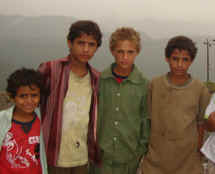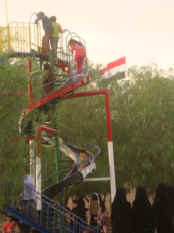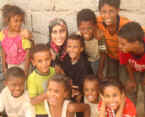|
Smile, you are in Yemen!
(Abtesem, anta fi al-Yaman)
by Warda Eissadi
The author won first prize in the Society's essay competition for 2010. This year she is due to commence a degree course in Arabic at SOAS, University of London.
The time had come, and the moment I had been so eagerly waiting for had finally arrived.
I sat in the airport recalling those very same moments five year earlier.
My trip to Yemen in 2005 was a life turning experience, and one which had ever since made me eager to go back again and again. With my studies finally over and about to venture on a gap year, I was determined to explore Yemen as fully as I could. I left behind friends who were shocked, worried and confused by my decision; they could not comprehend the idea of me wanting to go to this foreign country; a land portrayed in the media as a terrorist haven, where pretty much the only coverage on the news was when fighting occurred. I understood their perplexity. It was no wonder that they could not relate to all the beautiful things I have seen and experienced in Yemen.
By living amongst Yemenis, I began to view Yemen from a different angle.
The further I allowed myself to engage with the country and culture, the more I learned and the deeper I fell in love with it. I started to appreciate that Yemen was more than just simply 'the poorest country in the Middle East'.
Apart from my historical and geographical fascination for the country, one of my main interests lay in the children and young people of Yemen.
Being young myself, I wanted to find out how far the lifestyle of a Yemeni youth living in Yemen was different to the way of life of somebody like me who was brought up in Britain.
Looking back on my visit in 2005, nothing could have prepared me for what I was about to experience. I was aware of the poverty and the simple life that they lived. But there was so much more! Initially, my stay in the city of Aden, in southern Yemen, was supposed to be for the longer duration, and I intended to only visit Al-Baitha village for no more than one or two weeks. But, as so often with life, quite the opposite happened and I found myself reluctant to depart from this rural community and its people. Thus, I spent my whole time there and only returned to Aden a few days before my flight.
What possessed me to stay in a remote village where people lived very simple lives, herding the animals and harvesting their crops? I don't know, but what I am sure about is that every single day I spent there was beautiful! Yes I know, it's not a very convincing answer when you consider the attractions of Aden with its large modern shopping mall, hot sunny days, miles of glistening beaches with the warm blue sea brushing up against the golden sands... but it's one of those things you'll never appreciate enough until you experience the simplicity of rural life and feel its satisfaction. Perhaps it was the new and contrasting way of life in the village which intrigued me.
Living with Baithanis opened my eyes and has taught me a lot of things.
It was very interesting to learn about their social interaction, segregation, the roles of individuals within the community and their mutual respect in dealings with one another. In addition to that, what really fascinated me was their daily routine. Unlike my busy lifestyle back in London where I would be very dependent on my watch or the clock on my phone, people in Yemen (particularly in the village) rarely referred to the two-hand instrument on the wall.

Yemen is predominantly a Muslim country, so it comes as no surprise that their day revolves around the 5 daily prayer times. This is further assisted by the athaan(call to prayer) from the masjids, amplified by large speakers to reach hundreds of homes.
Some of the children I met were perhaps only 10 or 11 years old. Yet their maturity was astonishing and really made me question mine! To me, it seemed as though Yemeni children were very mature for their age... Or could it be, perhaps, that it is I and other youngsters in Britain who were immature at that stage in our life? I was impressed with how the girls managed to balance their day; having fun, playing, enjoying themselves as any other child would, yet were almost instantly prepared for a 'mature mode' at the right times. I believe that the responsibilities and expectations characteristic of their society play a major part in this. For example, children "particularly girls "are taught to partake in 'womanly' activities and house chores from an early age. What was puzzling, however, was seeing 7 and 8 year old little girls wanting to participate in the cooking, cleaning etc. Typically, whilst growing up in London I would have come up with as many excuses as I possibly could in order to avoid doing the cleaning! So being amongst younger girls who did the job without having to be told was a little strange.
I also met Afraah and Fatima "dedicated learners who inspired me to continue with my education. It was a refreshing change from being surrounded by students in the West who frequently dropped out of school or college. Afraah, Fatima and I would normally spend our afternoons under the sun in the fields with a book and pen in hand whilst I taught them English.
How far had the girls moved on in life? How much has the country changed/developed 5 years on? How is life for the Youth in Yemen today? And what opportunities does this country offer to its young people? These were questions I set out to find an answer to.
On my recent visit to Aden, whilst visiting the different areas I noticed a large proportion of young people filled the streets. A popular spot was Aden Mall where people could shop, eat, or play a game or two of bowling.
As I walked along the roads and passed old-style buildings of homes and flats, I saw large numbers of children playing freely in their neighbourhoods whilst men were scattered on the pavements in little groups chewing the nation's popular leaf, qat. At first I found this strange and shocking. But at the same time it was intriguing to witness very old
men sitting alongside middle aged and young teenage boys, all happily socialising and chewing away.
But why are they on the streets?! All this to me was unusual because I would associate sitting on the ground, with beggars and poor people; but it was normal for them, and also for men from middle class and well-off families. I asked a few people why they hung around on the streets and I got answers varying from 'because the ladies are in the house' to 'there's nothing else to do'. One young teenager laughed and replied 'where else am I going to go?' And that was a very interesting question.
With the help of a Yemeni friend living in Aden, I started to look into existing activities, clubs and organisations that run programmes for the youth. Firstly, I found out that 'Shabaab', the Arabic for 'Youth', was used to refer to anyone between the ages of 18-30. This is in contrast to the
11-19 years old range generally used in Britain's youth service. Secondly, I found it hard to find an equivalence of youth clubs that existed in the UK. However, there were fee paying clubs ('nadis') offering mainly sports activities to members, and not young people specifically. It is generally agreed that over 50% of Yemenis live under poverty.
Therefore, leisure activities and joining clubs would be beyond the resources of many youths. The limited availability of public parks meant that children played football in abandoned open space around the neighbourhoods. In Sana'a, however, I saw 'Hadeeqat Asab'een' (Park 70) filled with families and children enjoying themselves. I visited it once on a Tuesday and to my surprise there were officers at the entrance refusing entry to men. When I enquired about this, I discovered that Tuesday was a women-only day; a restriction to cater for women's needs and comforts. And indeed, the whole atmosphere inside the park was very different.
Women were more relaxed, their niqaab (veil) was off, girls were playing on rides and chasing one another freely. Also whilst in Sana'a, I had come to learn that Afraah whom I had met 5 years earlier, was now married and living in Sana'a. She was very happy, although a little disappointed as she had hoped to go on to university and later teach.

Continuing my search, I visited slums and neighbourhoods as well as institutes in Aden such as the UP Center and the National Institute of Administration and Sciences, where young people could sign up for a range of courses. From interviewing and speaking to young people, a passion for learning was evident in many Yemenis. I asked them what they believed to be the major issue which youths in Yemen faced today, and almost all echoed the same answer. Unemployment. When I asked what they did in their spare time, I generally received 'chew qat '/ 'go out', from the boys, and 'watch soaps/ TV' or 'go to a friend's house', from the girls.
However, I did come across some active and inspiring youths such as Samar who is part of 'Da'imoon' in Sana'a "an organisation founded by young people which provides voluntary services. Others were members of the Youth Union in Aden, who invited me along to spend Eid Day in hospital celebrating it with children suffering from cancer and liver failure, and putting on a party for them.
During my research, I have come across various kinds of young people in Yemen, from the purely lazy to others who were simply stuck in unfortunate circumstances. However, I personally could not see many opportunities that were being offered by the Yemeni government to its youth. And this was something many Yemenis have expressed concerns about. However, despite that, I am pleased to be able to say that I could definitely see the presence of hope and passion driving dedicated young Yemeni individuals to achieve their best in the situation and country they are in.
Recalling what a Yemeni youth once told me ... 'Smile, You are in Yemen!'
 |
|
The author (in headscarf) with children. |
Vol
19. 2011
|
